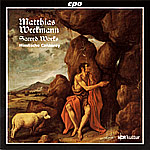Matthias Weckmann was barely in his teens when his father Jacob realized the extent of his talents and sent him to study with Heinrich Schütz in Dresden in 1628. Schütz remained a mentor and close friend to Weckmann (Weckmann survived Schütz by only two years) and his influence can be heard throughout this program of rarely recorded though often very beautiful sacred works. Especially welcome is one of Weckmann’s most important settings–Wenn der Herr die Gefangnen zu Zion erlösen wird (When the Lord restores the captives to Zion)–where in the final movement Weckmann creates striking harmonic dissonances by contrasting the vocal and instrumental parts. Himlische Cantorey takes full advantage of the potential expressive disparity, delivering a wonderfully engaging performance.
Three other works offered–Zion spricht: Der Herr hat mich verlassen (Zion speaks: The Lord has forsaken me), Wie liegt die Stadt so wüste (How the city lies barren), and Weine nicht (Do not weep)–previously have received fine performances by Paul Agnew, Stephen Varcoe, and Susan Gritton (among others) with the Purcell quartet on Chandos. In comparison, Himlische Cantorey favors slightly slower tempos, with vocal soloists sounding more uniformly balanced with the rest of the ensemble. And speaking of vocal solos, Veronika Winter’s entrance in Wie liegt die Stadt so wüste, with solo organ continuo, is ravishing–as are her subsequent duets with bass Ralf Grobe.
In addition to being ideally balanced, CPO’s sound is amply detailed yet acoustically spacious. In his thorough notes Heiko Maus’ enthusiasm and advocacy for Weckmann couldn’t be more warmly apparent. This is recommended to all listeners interested in sacred music of this period–and for anyone looking for a perfect introduction to one of Schutz’s few star pupils.
































